Hardy Short Season FigFicus carica OlympianHeight: 12' average mature height Hardiness Zones: 6-8 Find my zone Aspect: half shade to full sun
Size Availability
Out of season.
Our main crop of most plants is available starting in late fall.
Additional batches of plugs and quarts are usually added in May.
Many of our plants are propagated in limited quantities and can sell out quickly when posted, get on the notification list below so you don't miss out. Add your email to be notified as soon as we have them back in stock:
This does NOT subscribe your email to any mailing lists, our system will only send an inventory notification message.
Olympian Fig trees are hardier than most other fig varieties and will also produce crops in colder climates with short seasons. Even at our nursery in zone 8 a lot of fig varieties will produce one crop early in the season and then fail to produce a strong second crop in the fall because the weather is getting cold. But 'Olympian' produces two crops consistently even in much shorter seasons than what we have here. The fruit is usually produced starting in the second or third year.
Pruning and Caring for Olympian Figs
Olympian is a medium to large size fig, so we prefer to prune the tops when young to ensure lots of branching down low to encourage fruit production where it is easily accessible. Prune in the winter down to three or four buds on each branch to encourage strong branching while leaving enough for fruiting the following season. As the trees mature, switch to pruning out branches that crowd other branches but no longer cutting back the main stems. You can top the tree to six feet of growth each year to keep the plant smaller.
Olympian Fig trees are far more tolerant of extreme pruning than most other varieties and can be kept dwarf while still producing fruit. We have several trees that we prune back very hard several times per year for cuttings and these trees still manage to produce fruit even though they are constantly kept shorter than two feet tall. This quality makes Olympian one of the best choices for extremely cold climates where you can grow the tree in a container and bring it indoors for the winter.
Figs prefer moist soils with lots of organic matter, consider adding shredded bark or compost when planting if your soil is poor. However, we have compact clay at our nursery and we still get at least 80% of the normal fruit production on un-amended trees so if you can't improve your soil it's not the end of the world. Fertilize with a slow release pelleted fertilizer in early spring, such as Osmocote Plus 18-18-18.
Propagating Olympian Figs
Figs are relatively easy to propagate from cuttings, especially in winter using hardwood cuttings. Cut stems five to eight inches long with the bottom cut just below a node, dip in rooting hormone and stick an inch deep in loose potting soil in mid winter.
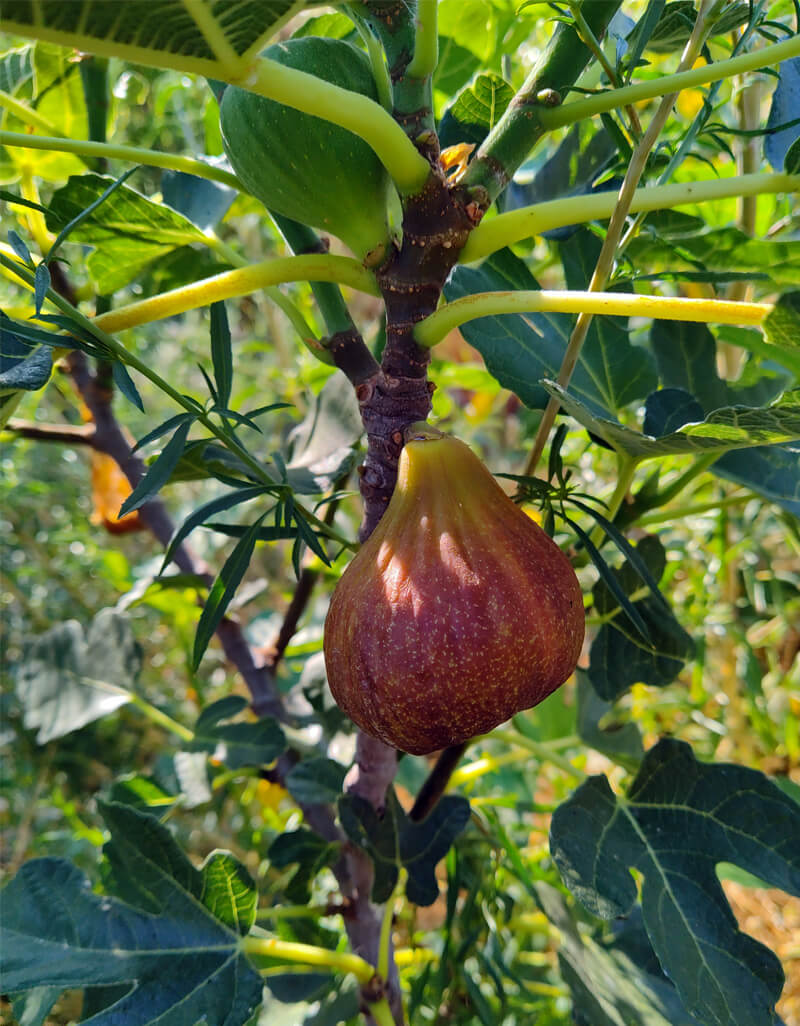
Ficus carica Olympian - Hardy Short Season Fig

Dark colored fruit are similar to Black Mission Fig, just produced earlier.
Image Credit:
Wikipedia:Common-fig
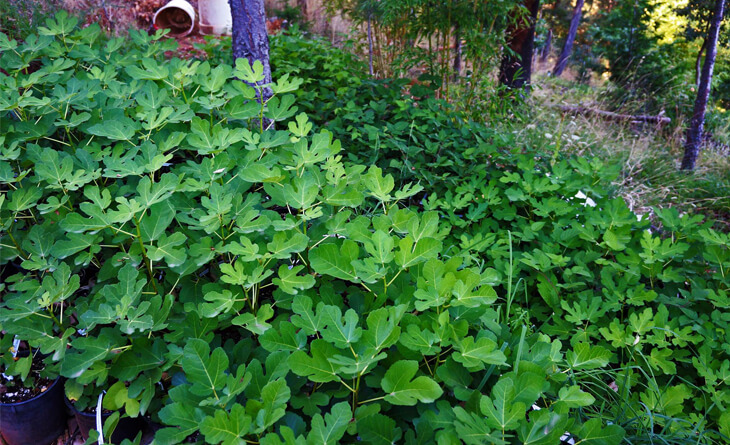
One gallon Olympian Figs ready to get potted into five gallon containers. 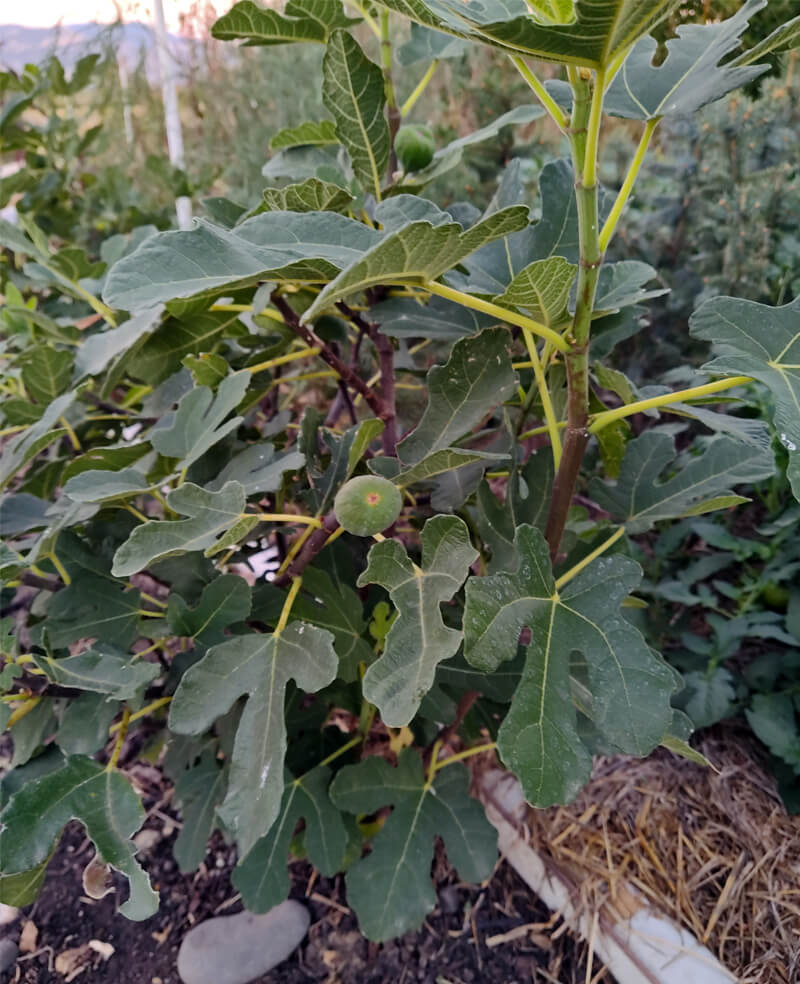
This Olympian Fig tree still produces fruit even though we cut it back 3-4 times per year for cuttings.
Packing Plants For ShippingMost of our plants are shipped bare root while they are dormant from late November through April and ship via the U.S. Postal Service. Bamboo plants can be shipped in their containers year-round by UPS.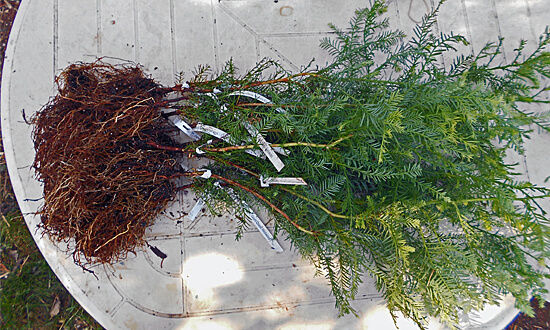 Bare root plants are soaked and wrapped together in bundles. ictured are 10x 24 inch tall Coast Redwoods. 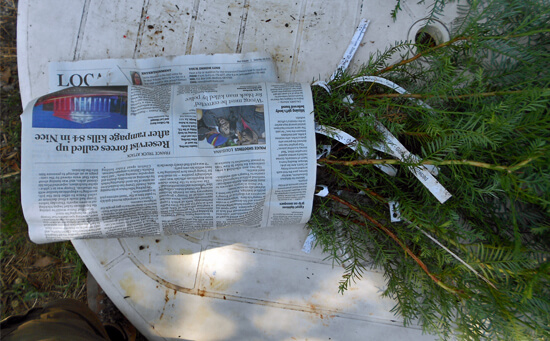 The bundled plants are wrapped in paper and labeled by variety. 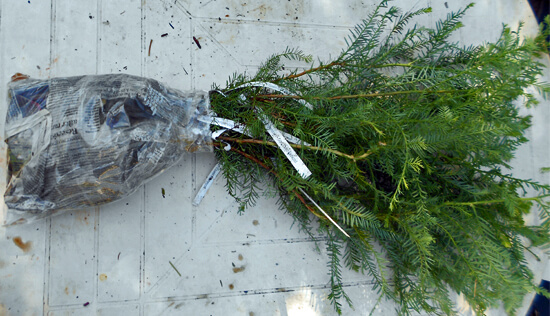 The bundle is wetted and bagged. 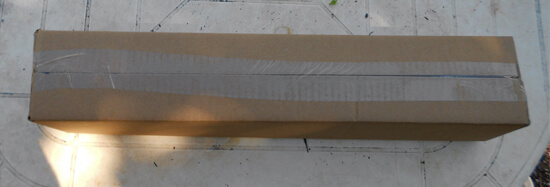 Bundles of plants are secured in long boxes. Pruning and Plant SizesWe prune both the tops and the roots of our plants at least once per year while they are growing in our nursery to ensure they develop a strong, dense form. Regular annual pruning goes a long way to ensure a healthy branching structure and this is often a missed step in many nurseries. Pruning a plant back hard after it has been neglected pruning-wise often results in an irregular branch habit or multiple leaders so we prune early and regularly instead. We also prune the roots of our plants while they are dormant which causes them to produce a much more branched structure and helps to elimate tangled masses that hinder future development. Plants that have been root pruned establish themselves much more quickly than root bound plants. Generally, hardwood plants will be pruned in the winter and conifers will be pruned in the summer.Before shipping plants we prune the tops and roots one last time. Conifers will usually have very little pruning except to balance out long branches. Shrubs are usually pruned to around 1-2 feet tall to encourage low branch development and small to medium sized trees are usually pruned to around 36-40 inches. Pruning trees at this height encourages dominant branches to begin forming around 3 feet from the ground which typically looks the best in most situations. However, if you want a tree to have branching start higher (some city codes require trees to not branch below 4 feet) we have longer boxes available. To request taller trees please contact us at least three days before your ship date. Depending on your location and the shipping routes there may be a fee for oversize package handling (usually about $15 for a 60 inch box). 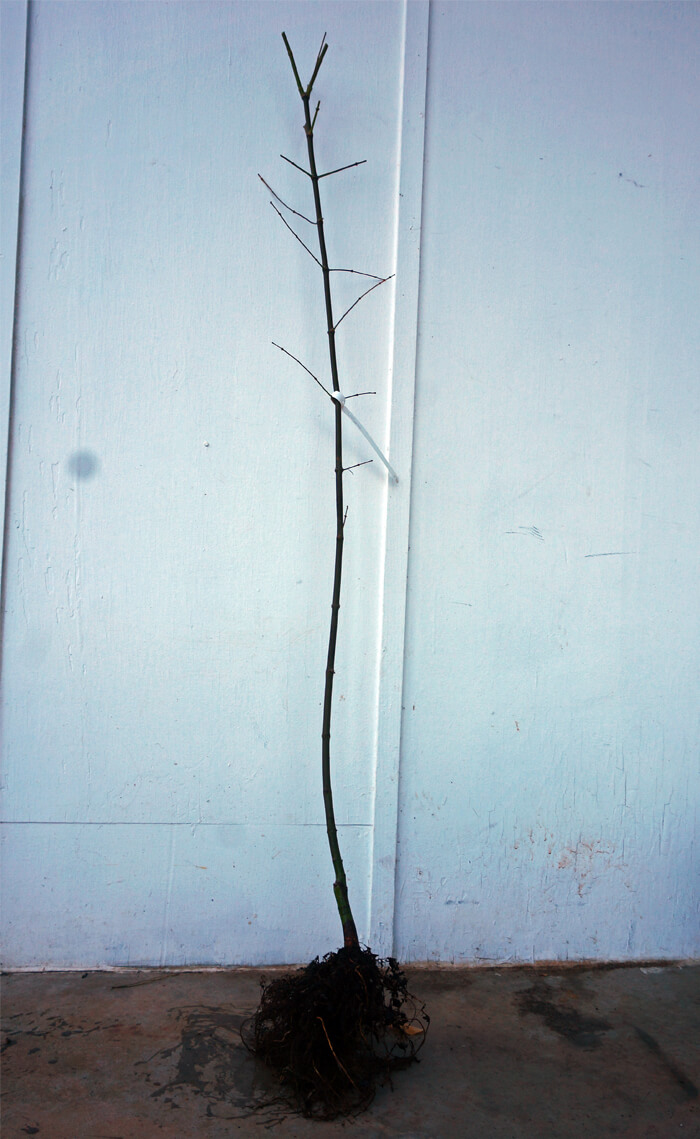 Tall trees (Oaks, Ginkgo, large Maples, etc.) are pruned to 40 inches to encourage crown development from about 36 inches and up 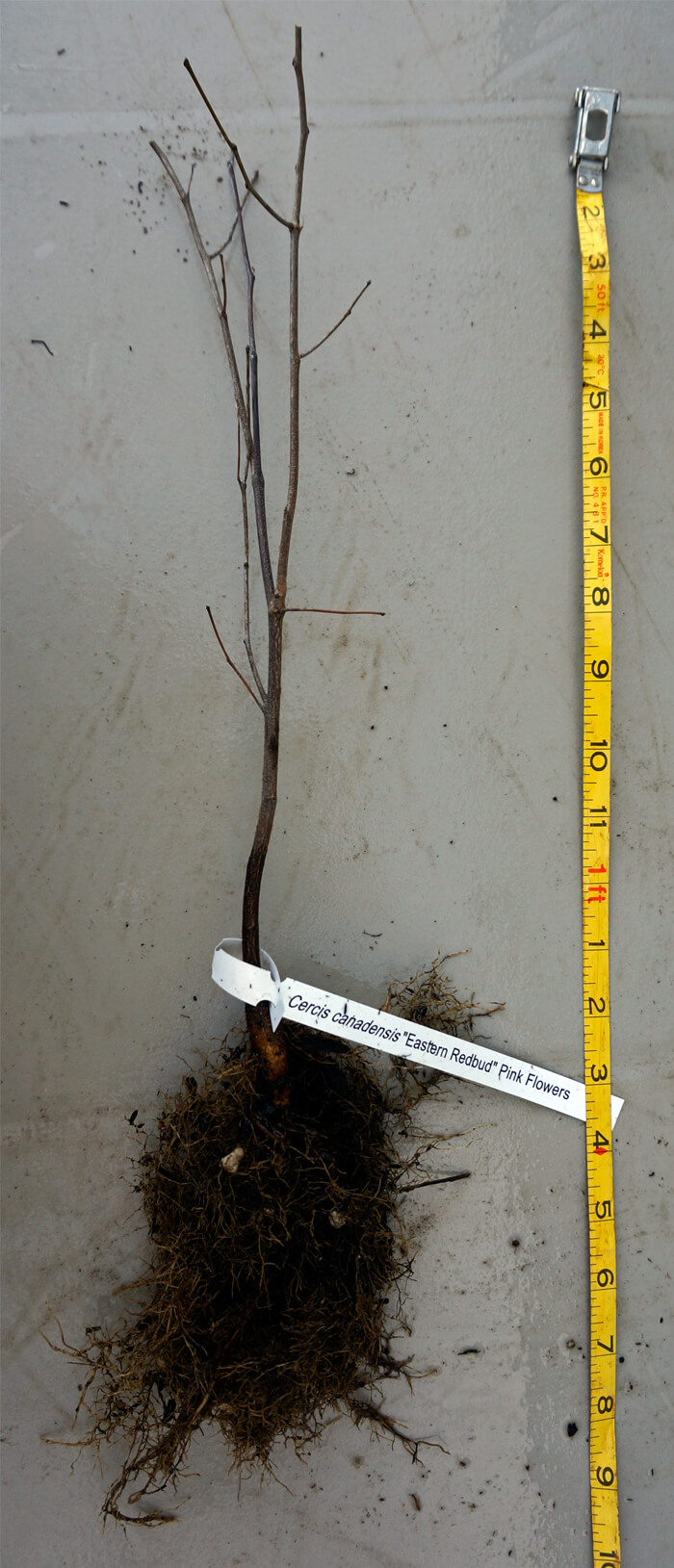 Small and medium trees (short Maples, Redbuds, Stewartia, etc.) are pruned 10-20 inches above the prune line from last year 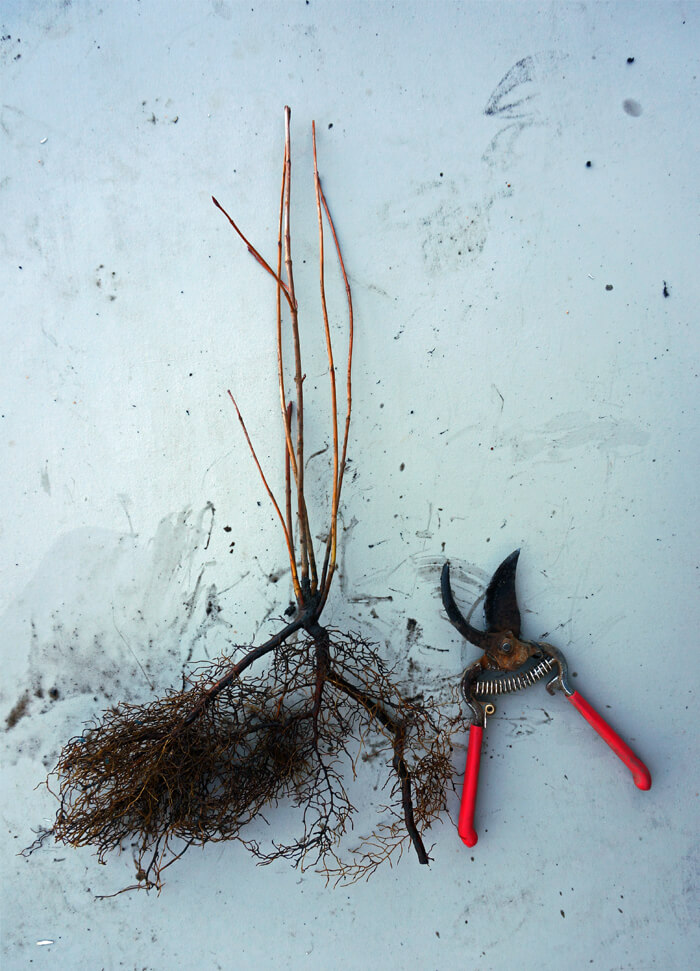 Shrubs (Weigela, Hydrangea, Viburnum, etc.) are pruned to 18 inches tall and root pruned one last time 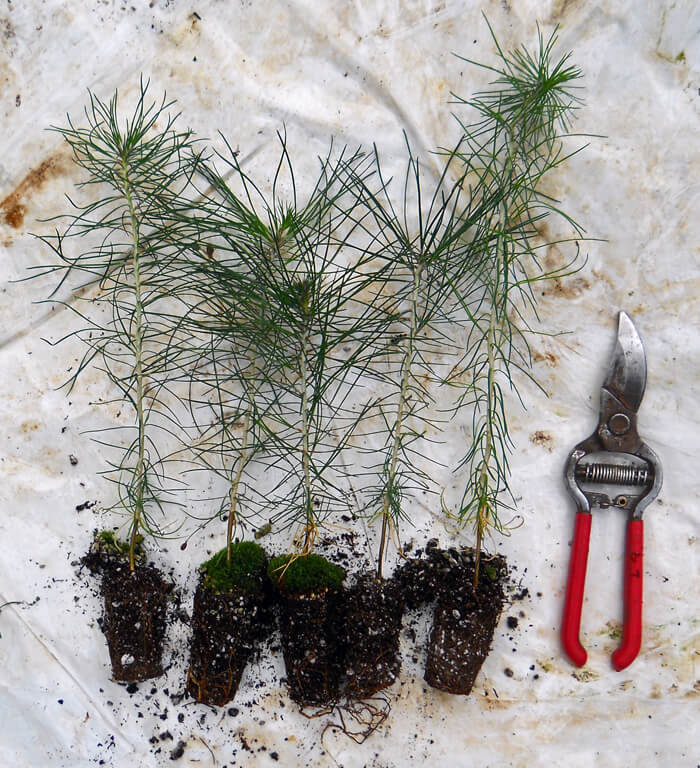 Small plug size Bamboo Plants Are Shipped In Their ContainersBamboo roots are not flexible and so plants have to be shipped in their containers. These plants are heavier and are shipped separately from bare root plants. Because they are potted they can handle longer transit times so can ship via UPS Ground instead of USPS Air Mail. Potted plants can also be shipped year-round.We regularly top our 1 gallon bamboo plants at 24-30 inches tall throughout the growing season. This results in dense, bushy foliage while allowing for economical shipping. From this size most running species will grow to 5-6 feet tall in the first spring and clumping species will usually grow to 4-5 feet tall. 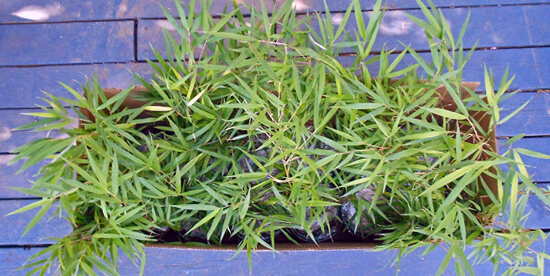 1 gallon bamboo plants strapped in and ready to be sealed. Unpacking Bare Root PlantsYou will be sent tracking details as soon as your plants are shipped. Unpack your plants as quickly as possible after they are delivered. We use two types of boxes, side-sealing and top-sealing. For boxes that are taped along the whole length you can cut the tape on either side and remove the plant bundles by cutting the tape holding the bundle to the bottom. For boxes that are sealed on the top and bottom, it is easiet to open the bottom of the box (the shipping label is at the top) and pull the bundle of plants out straight out. Check that the box is empty as there can be a second bundle of plants stuck towards the top.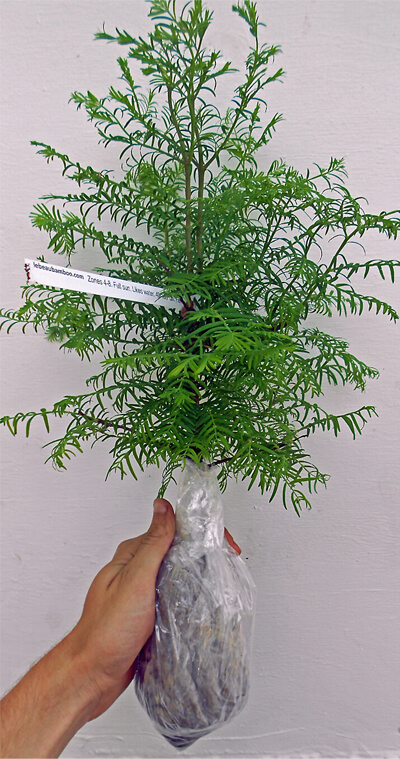 A bundle of trees. What if I am not able to plant right away?You can usually leave the plants in their shipping container unopened for 1-2 days if there were no shipping delays and you have received your plants from late November through February. Plants shipped when it is warmer can't stay in their packages for as long. |
Size Availability
Out of season.
Our main crop of most plants is available starting in late fall.
Additional batches of plugs and quarts are usually added in May.
Many of our plants are propagated in limited quantities and can sell out quickly when posted, get on the notification list below so you don't miss out. Add your email to be notified as soon as we have them back in stock:
This does NOT subscribe your email to any mailing lists, our system will only send an inventory notification message.
|

